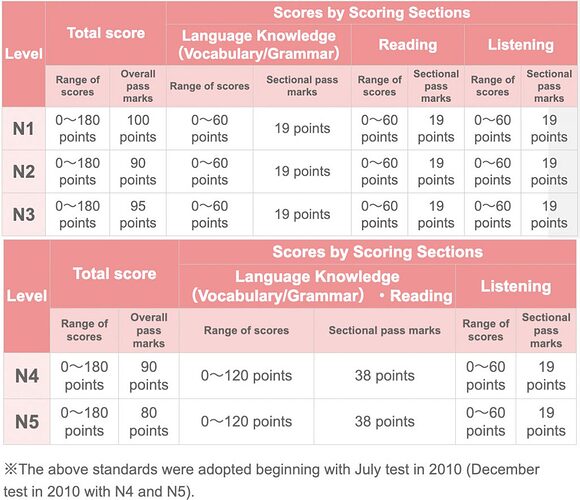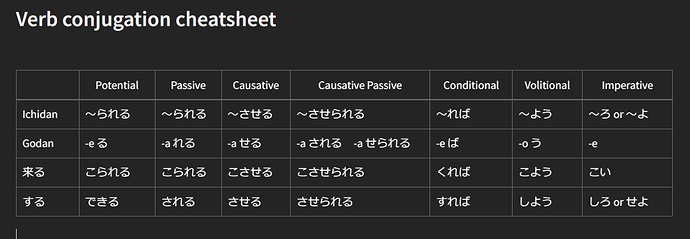That sounds like a good plan, but I worry if you cry onto the answer sheet a lot and all the answers melt together, the Scantron will either explode or think the eggs are frying so well that the oil is spitting, so it will consume you on the spot using its special JLPTeatime function 


I am totally in the pits of despair about the listening section. Hoping against hope I can get one more mark than the pass rate. I can recognise the verb but not how it’s being used/conjugated, so on the multiple choice ones it’s the same thing: ah yes I recognise the verb, its A, oh wait B also used that verb, and C too! 
I plan on continuing with bunpro reviews/cram and hard focusing kanji for the next month. I took a practice exam for the N2 and got a 26/31 on the comprehension section and only 1 wrong on the listening. Looks like I’ll just have to cram in a huge load of kanji and readings before the test and hope it sticks 
Turns out doing N4 in half a year was slightly too much. I’m going to cram  and pray
and pray  for the next month. I hope it works out
for the next month. I hope it works out 
I’ve not taken a test for a really long time. Last one I took was N3 back when there were only 4 levels (showing my age and the embarrassing length of time I’ve been studying!) Will be taking N2 this December. Does anyone know how the combined grammar and vocabulary test is scored? I’ve read that the pass mark is 19, but is that for them individually or combined?
I just got the voucher for N2.
Some stats of my location for anyone that is interested:
| Level | Applicants 2023 | Applicants 2022 | Diff |
|---|---|---|---|
| N1 | 20 | 29 | - 9 |
| N2 | 45 | 45 | |
| N3 | 75 | 63 | + 12 |
| N4 | 105 | 116 | - 11 |
| N5 | 127 | 125 | + 2 |
| Total | 372 | 378 | -6 |
Good luck for everyone!
I’ll be in Philadelphia for N2! Good luck everyone
Looks good, I would recommend trying to watch as much Japanese through youtube as possible, reading some manga, and watching some Japanese netflix with a VPN before your test. It will give you some intuition to Japanese structures where you won’t even really have to think about it.
This won’t show up on the test but its good to know that a lot of time in casual speech, younger Japanese speakers will simply at ーれる to all potential forms as its easier to say and creates a distinction between ichidan potential and passive forms (食べる⊳たべる⊳たべられる⊳drop the ら⊳たべれる(Can eat))
Hi everyone, I’m signed up to take the N2 in December, my first time taking a real JLPT, though I’ve taken the various practice tests on their websites over the years to gauge my progress.
I tried to take a past JLPT today and never even finished it and gave up in frustration halfway through the reading, so I’m pretty demoralized right now. The worst part is that this test mostly had questions I’d already seen before (due to being incorporated into the 2012 practice test), and yet it was still a miserable struggle.
Grammar has always been my weakest section through all the years I’ve been studying Japanese and the various practice tests I’ve taken, but I’ve never found a good way to study grammar. I even tried a JLPT prep grammar book recently, but it didn’t help much. Now I’m trying Bunpro, but I doubt it will help much either, and it also looks like I won’t even get through N3 by the time of the test anyway, much less N2.
On the bright side, at least there doesn’t appear to be a minimum score for grammar. Going by the chart posted upthread, it’s paired with vocab (my strongest section) as far as the section minimums go. I almost wonder if it would make sense to just not take any time and randomly guess on the grammar questions in order to save more time for reading.
Of course, I need to improve a lot in my essay analysis skills (i.e. reading) as well, and I’m not sure how to do that either.
Mileage may vary, when I was studying for JLPT N2 for July 2022, I found that while Bunpro and Anki had gotten my 90% of the way I was very slow with the reading section, and then in an effort to get faster I’d read things incorrectly.
Although probably not the sexiest answer, I didn’t find any tricks and just drilled a lot of the questions from JapaneseTest4You, as well as read through the 新完全マスター series. The book specifically on reading (読解) eases the reader in with considerably easier material and ramps up gradually, while also providing decent explanation for it’s answer sheet in case you got something incorrect (at least you can figure out why).
While I didn’t find it helped me with my ability to read quickly, nor did it offer any vocab/kanji/grammar that I’d not found from Bunpro or my anki decks (though there are books for this specifically also) it gave me the confidence that I can read and that I shouldn’t be so anxious while doing it - which made the biggest difference imho.
I plan to buy the 新完全マスターN1 series also as a part of my prep for July 2023, I hope they’re as helpful for yourself as they were for me.
Best of luck!
Thinking positively, the gap between just guessing, 25%, and the passing % is not that big, so if you know a bit and can guess a lot, you can still pass 
Is there any scaling that goes into the score? If it’s just a raw percentage and you literally just have to get at least 50% of the questions correct, that makes it seem a lot easier.
Also, I have done a fair bit of reading, but it was all fiction. Part of what makes the JLPT reading hard is that it’s about essay analysis.
According to the N4 practice tests I’ve been taking, each question can be worth 1, 3, or 5 points but the official practice test answer sheet doesn’t show those values.
For the last couple of weeks I’ve been cramming the 新完全マスターbooks for reading and listening. This week I started on the 日本語総まとめ books and the grammar section has been a huge help.
I took another practice test this morning and I got a 107/180. About 6 points higher than two weeks ago. My goal is to get around 130ish on a practice test. I know I won’t do as well in person and I’ll need that margin.
I looked into this and the JLPT uses mysterious black box “scaled scores”. The official website just says they use IRT but doesn’t give any more details. But it sounds like it amounts to comparing you against all the other test takers using a complicated statistical model to estimate your ability relative to everyone else’s. And since the pass threshold is 90/180, it implies that around half the people who take the test will fail, no matter what. Isn’t that cruel or what? It seems completely unfair to have a test which is impossible for everyone to pass. Especially since you’re competing against other people who think they can pass and paid $100 for the privilege, not just a random sample of the population.
Update: I looked up JLPT pass rate, and wow, just wow. I can’t believe I was overly optimistic, thinking that half of test takers are doomed to failure. The actual pass rate is 26.4% for people taking in Japan and 47.1% for people taking it overseas for a pass rate of 37.3% overall.
Unfortunately, the marks needed to pass aren’t known and can vary a lot.
They don’t release exact details of how they arrive at your score out of 60 (or 120) on sections, but they have a little information here:
Something I would keep in mind is how much people actually study before taking whichever level they’re about to take.
I’m living in Japan, and know a lot of other foreigners that are taking or have taken the JLPT.
In Japan, we can sit it twice a year, so sometimes people will just take the next level to see what area they need to improve in.
Other people vastly over estimate their skills when it comes to the JLPT.
I think you would be shocked to know how many people haven’t studied for the JLPT at all, instead they think that their every day study materials will be enough to pass. When in reality, the JLPT is like any other test. Even if you’re very knowledgeable about the topic, it doesn’t mean you know how to pass the test.
I’m going to be sitting the N4 test in Dec, and although I think I will pass, it’s not guaranteed.
Yet, a friend of mine confidently sat N3 in July with less kanji and grammar knowledge than I have.
Needless to say, they did not pass.
I asked them about their studying, and they didn’t do any specific study for the test. They just thought they were good enough.
for reading, the best thing you can probably do is practice reading out loud while focusing on minimizing stuttering or pausing between words. you’d be surprised how much time is wasted because people reread the same word in their mind more than once. If you’re confident in your ability to read without stuttering, then you can step it up and put a paragraph into a text to speech tool and try to read along at the same pace with or faster than the bot. Being able to do this consistently will most likely help you avoid being timed out during the essay sections. Comprehension on the other hand will depend largely on your grammar and vocab knowledge.
My biggest problem on the reading sections is that I just get mentally overwhelmed while trying to make sense of the subject matter. Also, I tend to glaze over whenever there’s a very long complex sentence.
Edit: In other news, I just took a practice JLPT exam that turned out to be identical to one that I previously took in mid-October… and I did worse this time around.


